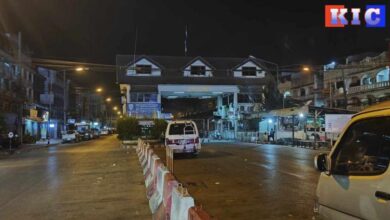Karen Group Warns JICA Plan Could “Fuel Conflict”

A Karen environmental group has voiced its concern over a Japanese International Cooperation Agency (JICA) report detailing development plans for southeast Myanmar.
The Thailand based Karen Environmental and Social Action Network Group (KESAN) raised the concerns in a document released to the press, saying that the 593-page document ‘Preparatory Survey for the Integrated Regional Development for Ethnic Minorities in the South-East Myanmar’ was deeply flawed.
“The Study is based mainly on existing government data; only limited field surveys were conducted and no public forums were held. The study team held discussions with various ‘stakeholders.’ There is no detailed list of stakeholders included in the report,” KESAN said in a statement to the press.
A KESAN spokesperson, Saw Paul Sein Twa, said that JICA’s plan for development in Southeastern Burma highlighted a lack of understanding of the realities on the ground. “They [JICA] have failed to understand the key driving factors of conflict in Eastern Burma,” he said, “The plan could fuel new conflict.”
“For us the issues around the ownership and control over land and natural resources are one of the key drivers of the conflict and these must be resolved first.”
Saw Paul said that JICA’s development plan was ‘pre-packaged” and came as a surprise. “Our own people should be deciding our development path.”
Saw Paul also added that the development plans had no way of guaranteeing security and protection of human rights for local people. “We see an economic plan that can be exploited by the people in power to grab land and worsen the ongoing land conflict situation”, he said.
KESAN expressed frustration at JICA for just working through existing government structures before the peace process has led to political reform. “There needs to be structural change giving local people power over their own land and resources”, said Saw Paul.
According to Saw Paul, KESAN was only consulted about the project after the report had been released. “JICA asked us to consult with them after they had released the report – it seems they are moving as fast as possible after the ceasefire.” He said, “and when they asked our consultation it was only on minor details.”
Saw Paul pointed to the Kunlong Mega Project as a potential example of development being linked to human rights abuses. “The government and military crony companies use the army to militarize construction areas – people don’t receive compensation… they [foreign investors] need to ensure their projects don’t facilitate more human rights abuses.”
“At this time we call for a moratorium on development projects until we get rule of law, environmental regulations, democratic and constitutional reforms. We need a political settlement between the government and ethnic groups. Only then can we have a positive peace and then a sustainable people-centered development plan,” He concluded.
JICA – a segment of the Japanese Government – aims to “encourage all people to recognize the development issues they themselves face, participate in addressing them, and enjoy the fruits of such endeavors” through “inclusive development,” according to a mission statement posted on JICA’s official website. “JICA is advancing its activities around the pillars of a field-oriented approach, human security, and enhanced effectiveness, efficiency, and speed.” The mission statement added.
At the time of publishing, Karen News is still waiting on a response to emails and telephone calls sent to JICA requesting a response from JICA to the concerns KESAN raised in this story.




